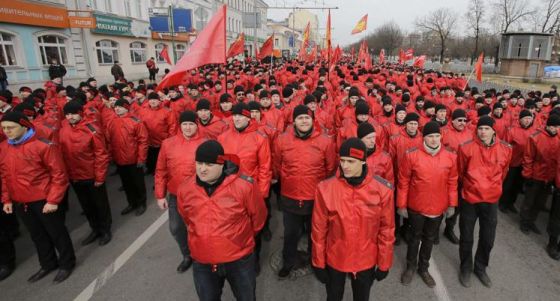A reader here just left a comment complaining about my “frothing support for the heathens who took Kiev by force,” and said, “I wish the people of Crimea the best and hope the vote tomorrow goes for separation from the u.s. / e.u.”
I can only imagine what kind of Manichean worldview lurks behind the reference to “heathens,” but the general sentiment here seems to one that is not uncommon among stalwart critics of American power. It seems to work like this:
If a prominent political leader antagonizes the U.S. and its European allies (I refer of course to the well-known demons de jour: Fidel Castro, Slobodan Milošević, Hugo Chávez, Mahmoud Ahmadinejad, Muammar Gaddafi, Bashar al-Assad, Vladimir Putin) and that individual is then vilified in the media, the mere fact that this person is being targeted in this way is taken as a sign that he must be doing something right. He symbolizes the rejection of Western hegemony and is conferred honorary membership to a select group of über-rebels who have the courage take a dramatic stand defying Western imperialism.
I am not immune to experiencing this sentiment, since power needs to be poked in the eye occasionally, yet that doesn’t mean that we should ignore the failings of those who are doing the poking.
But that’s what all too often happens when criticism of the US/the West becomes an obsession: it makes authoritarian rule become excusable.
To anyone who thinks that tomorrow the people of Crimea are about to release themselves from the stifling grip of European influence in exchange for a warm embrace from Russia, I simply ask: who do you imagine you would have felt more comfortable marching alongside in Moscow today?
The disciplined young men in the “Brotherhood and Civil Resistance March,” or with activists like Ilya Yashin who have the guts to say: “We are patriots and Putin is Russia’s enemy”?

Reuters: “The pro-Russian patriotic procession was held to express support to Russian speakers living in Crimea and Ukraine and protest against the policies conducted by new Ukrainian authorities, according to organisers.”


I honestly don’t yet know the answer your question . Maybe neither .
I don’t think your question will be confidently answered for a few, or a number of years, the search for the truth hidden by the slanted interests of all organs of power is an ongoing struggle. You website can generally be considered as being on the side of the searchers for truth rather than on the side of those who manufacture their own truths. The articles in this issue by Stephen Zunes and the interviews of ex-reporters of RT go a significant way for those of us who might wish to percieve the truth behind the curtains.
Since it might be said that the dangers of war are inversely proportional to the understanding of a thinking public possessed of the truth (or a reasonable facsimily of the truth) any effort to pull those curtains aside is operating in the interest of peace. Beyond that, the unmasking of those who create the lies (the optimum solution to war mongering) is almost impossible when such monsters can be protected by the owners of the curtains. Until we have international organisations with the power and the will to bring such people to justice the world remains hostage to private and state interests.
The comments, thus far, express my answer to the question: who would you march with? Especially, Mr. Davis’s. And I may never know as I am a nongenarian and my future is today.
At least in the eyes of us Europeans, America is famous for its limited resources in the irony department. The question in my headline was ironic and rhetorical. I imagined, perhaps wrongly, that the typical visitor to this site would not easily picture themselves marching alongside a paramilitary “brotherhood.”
When men put on uniforms and march in lockstep, they surrender their autonomy and conscience to a higher power. This usually involves imbuing the state with some kind of quasi-religious authority. This surrender produces a kind of intoxication through which the human capacities for violence can be unleashed in the name of the “fatherland” (or whatever construction of patriarchal power happens to be employed at that time). This is the nature of military power used to intimidate other states.
But when paramilitary organizations are formed, the powers of intimidation are generally being deployed within the state. Brownshirts, blackshirts, or red shirts — they’re all sending the same message: you can either align yourself with the glorified power of the state or you can risk being crushed under its heals.